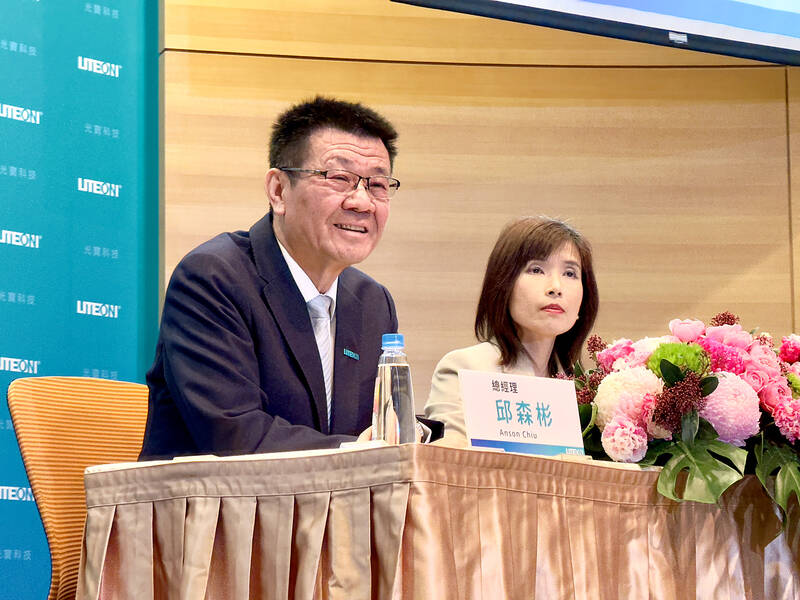Lite-On Technology Corp (光寶科技) expects its core businesses to post annual growth this quarter, primarily driven by accelerated shipments of high-end products related to cloud computing and optoelectronic semiconductors.
The electronic components manufacturer — whose products cover information technology and consumer electronics, cloud computing and artificial intelligence of things (AIoT), and optoelectronics — said sales this quarter would be lower than last quarter, but higher than the same period last year.
For this year, in addition to rising shipments of cloud computing power management systems for artificial intelligence (AI) servers, sales of high-end photocoupler applications in the machine vision, industrial and renewable energy sectors are also projected to grow quarter-on-quarter, Lite-On said in a statement.

Photo: Fang Wei-chieh, Taipei Times
“Lite-On continues to advance the progress of growth strategy in our core businesses. These core businesses will be the growth engines to drive the company back onto a positive growth trajectory in 2025,” Lite-On president Anson Chiu (邱森彬) said in the statement.
“With the advent of the new generation of AI chips, Lite-On’s cloud server integrated power solutions are expected to create growth momentum,” Chiu said, hinting at increasing shipments of high-end power shelves, battery-backup-unit systems and other advanced system integration solutions.
Contributions from those AI-related power supply products are expected to account for 14 to 15 percent of the company’s sales this year, compared with 7 to 8 percent last year, Chiu said.
As for integrated solutions for liquid cooling and cabinet systems for severs, he said their contribution would be less than 1 percent of its total sales this year, as this new business is still in its preliminary stage, but such products are expected to become an important growth driver in the next two to three years.
Chiu’s remarks came as the company yesterday reported weaker-than-expected earnings per share (EPS) of NT$1.33 for last year’s October-to-December quarter due to slower improvement in both gross margin and operating margin, which fell on an annual basis to 21.3 percent and 9.1 percent respectively in the quarter.
Yuanta Securities Investment Consulting Co (元大投顧) had expected the company to post fourth-quarter EPS of NT$1.6, with gross margin of 22.9 percent and operating margin of 9.26 percent.
Lite-On posted a retreat in annual sales last year, down 7.56 percent to NT$137.12 billion (US$4.18 billion), despite a 3.76 percent increase in the final quarter of the year, at NT$38.3 billion, on the back of more than 20 percent growth in the cloud computing and AIoT business.
With last year’s total EPS coming in at NT$5.1, down from NT$6.36 the previous year, the company’s board of directors approved a plan to distribute a cash dividend of NT$4.5 per share, the company said.
That suggests a payout ratio of 86.31 percent.
In response to the US tariff policy and to comply with global diversification trends, coupled with the robust demand for battery-backup-unit systems, the company would continue to expand its production facilities in Dallas while also providing electric vehicle charging pile-related products, Chiu said.
Capacity expansions at its plants in Kaohsiung and in Quang Ninh Province in northern Vietnam are also proceeding as scheduled, he said.

In Italy’s storied gold-making hubs, jewelers are reworking their designs to trim gold content as they race to blunt the effect of record prices and appeal to shoppers watching their budgets. Gold prices hit a record high on Thursday, surging near US$5,600 an ounce, more than double a year ago as geopolitical concerns and jitters over trade pushed investors toward the safe-haven asset. The rally is putting undue pressure on small artisans as they face mounting demands from customers, including international brands, to produce cheaper items, from signature pieces to wedding rings, according to interviews with four independent jewelers in Italy’s main

Japanese Prime Minister Sanae Takaichi has talked up the benefits of a weaker yen in a campaign speech, adopting a tone at odds with her finance ministry, which has refused to rule out any options to counter excessive foreign exchange volatility. Takaichi later softened her stance, saying she did not have a preference for the yen’s direction. “People say the weak yen is bad right now, but for export industries, it’s a major opportunity,” Takaichi said on Saturday at a rally for Liberal Democratic Party candidate Daishiro Yamagiwa in Kanagawa Prefecture ahead of a snap election on Sunday. “Whether it’s selling food or

CONCERNS: Tech companies investing in AI businesses that purchase their products have raised questions among investors that they are artificially propping up demand Nvidia Corp chief executive officer Jensen Huang (黃仁勳) on Saturday said that the company would be participating in OpenAI’s latest funding round, describing it as potentially “the largest investment we’ve ever made.” “We will invest a great deal of money,” Huang told reporters while visiting Taipei. “I believe in OpenAI. The work that they do is incredible. They’re one of the most consequential companies of our time.” Huang did not say exactly how much Nvidia might contribute, but described the investment as “huge.” “Let Sam announce how much he’s going to raise — it’s for him to decide,” Huang said, referring to OpenAI

The global server market is expected to grow 12.8 percent annually this year, with artificial intelligence (AI) servers projected to account for 16.5 percent, driven by continued investment in AI infrastructure by major cloud service providers (CSPs), market researcher TrendForce Corp (集邦科技) said yesterday. Global AI server shipments this year are expected to increase 28 percent year-on-year to more than 2.7 million units, driven by sustained demand from CSPs and government sovereign cloud projects, TrendForce analyst Frank Kung (龔明德) told the Taipei Times. Demand for GPU-based AI servers, including Nvidia Corp’s GB and Vera Rubin rack systems, is expected to remain high,